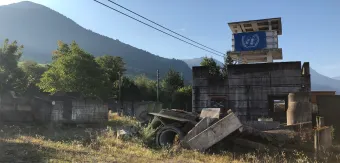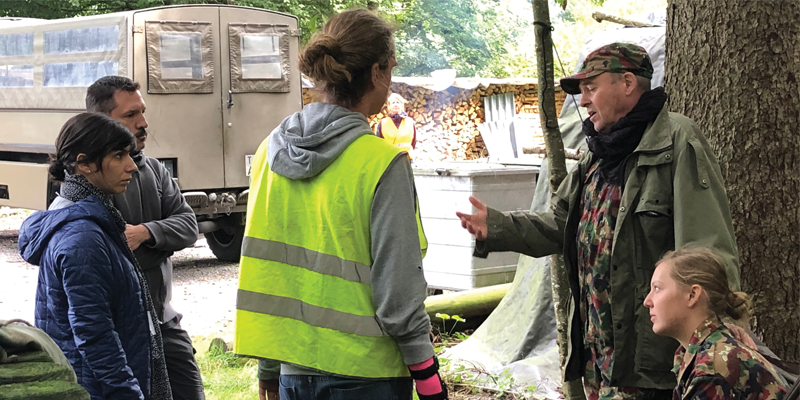Training in Switzerland strengthens international peace missions

Training in Switzerland strengthens international peace missions
Participants in the Swiss Peacebuilding Training Course play out a fictitious scenario as a UN team on patrol in "Mikeland". They drive their jeeps through mined area and face a moral dilemma in a camp for internally displaced people. Although just a simulation, the training course allows its participants – from Switzerland and abroad – to acquire valuable skills for use in peacebuilding missions.
a minefield in an area of
woodland. © FDFA
Once a year, the Swiss Expert Pool for Civilian Peacebuilding (SEP) organises a Swiss Peacebuilding Training Course (SPTC) in collaboration with the Geneva Centre for Security Policy (GCSP), the swisspeace research institute and the Centre of Competence for Military Peacebuilding - SWISSINT. During the two-week course, a large pool of experts share their peacebuilding expertise with participants from Switzerland and abroad, providing them with specialist skills that they can use in peacebuilding missions around the world. The course encourages the development of new competencies and proposes theoretical and practical tools that the participants can use to tackle the fictitious yet concrete scenario of Mikeland. They take part in a one-day exercise as a UN team on patrol in Mikeland. The purpose of the exercise is to confront them with stressful situations that can arise in real-life operations and enable them to put the theory into practice.
On patrol in Mikeland
The UN team is on its way to a camp for internally displaced people. The jeep turns into a small area of woodland. All of a sudden, a man covered in blood bursts out of the bushes and forces the jeep to stop, yelling: "There's been an accident: please hurry! We need help!" The team is thrust into action: they hurry to assist the man, whose brother is sitting behind the wheel of a car with a gaping wound on his thigh. Very quickly they realise they are in a minefield. The team needs to make a hard decision: provide first aid or put their own safety first.
Mikeland: the fictitious setting for the Swiss Peacebuilding Training Course
Mikeland has been engaged in a long-standing conflict. After lengthy negotiations, the conflicting parties have recently signed a ceasefire agreement. The UN has deployed a peace operation to the still tense environment to help the parties resolve the conflict peacefully and hold free and fair elections. However, the focus is currently on the civilian population and on dialogue with the parties involved in order to guarantee security and safeguard human rights, monitor the ceasefire and build trust among the various stakeholders.
The camp for internally displaced people
The UN experts reach the camp for internally displaced people and immediately face difficult challenges: the team is not welcomed with open arms. The residents complain about the humanitarian situation inside the camp, in particular the lack of food and water. Tensions are rising. The tone becomes increasingly aggressive. Cries are heard from one of the upper floors of the barracks.
in pregnancy places the UN team
before a dilemma. © FDFA
A pregnant woman has lost a large amount of blood and is in a critical condition. The camp residents urge the UN team to drive the woman to hospital immediately. However, according to the strict rules, only UN personnel are allowed to be transported in UN vehicles. The team faces another dilemma: Should they override UN rules and transport the woman in a UN vehicle? If so, where to?
Self-reflection and critical analysis
During the one-day exercise, course participants learn to push their boundaries and to take the kinds of actions that can help minimise risks. Throughout the course, they are encouraged to critically reflect on their actions and to work together as a team, regardless of their different backgrounds, to develop solutions. "Most participants find these exercises to be of lasting value for their work and learn a great deal from the course," says the head of training of the Swiss Expert Pool for Civilian Peacebuilding.
At the end of the course, the teams are required to submit a regional action plan on selected topics such as security, human rights or good governance to a former special representative of the UN Secretary-General. The special representative checks the action plan and provides participants with specific feedback on its strengths and weaknesses based on his personal experience as a SRSG.
Purpose of the course
In the interviews below, ambassadors Simon Geissbühler (head of the Peace and Human Rights Division of the FDFA) and Thomas Greminger (head of the Geneva Centre for Security Policy GCSP) explain the benefits of the long-standing cooperation between SEP and the GCSP and the purpose of the course as part of international peacebuilding efforts.
Well trained professionals strengthen international organisations
Commitment to peace and security is one of Switzerland's four priorities set out in its Foreign Policy Strategy 2020–23. Well trained experts are an asset to organisations and have many career opportunities open to them. In order to achieve the goals in peacebuilding operations, the UN recommends effectively including and promoting local knowledge. Switzerland therefore also prioritises knowledge transfer. SEP invites experts working in crisis areas to attend its courses in Switzerland. At the same time, it supports training centres in Africa such as the School of Peacekeeping (EMP) in Mali and the Kofi Annan International Peacekeeping Training Centre (KAIPTC) in Ghana.
Switzerland is running for a seat as a non-permanent member of the UN Security Council 2023–24. As part of this body, Switzerland could put its long-standing expertise and credibility in the peaceful settlement of disputes to work for the international community.
Record of outstanding cooperation
The Swiss Peacebuilding Training Course is the result of many years of development and coordination work. The Federal Council set up a pool of experts in 2000, and the course was launched shortly thereafter. The course meets international training standards and provides participants with basic training for their civilian and police peacebuilding work.
The course is held at the Wil military premises near Stans-Oberdorf wherethe field exercises are conducted in cooperation with SWISSINT by the DDPS in order to be able to simulate real life challenges in conflict zones as realistically as possible.
Since 2007, the pool of experts has drawn on the comprehensive peacebuilding expertise of the GCSP and swisspeace in designing and running the course, which was opened to foreign participants so as to gain additional perspectives on its various topics and to promote knowledge transfer.
The Expert Pool for Civilian Peacebuilding (SEP)
Monitors observe the ceasefire in eastern Ukraine for the OSCE; they support the police in the Democratic Republic of Congo in solving crimes as part of the UN mission; and they help to develop expertise in ministries and international organisations. These are just three examples of how members of the Swiss Expert Pool for Civilian Peacebuilding share their expertise as part of civilian peacebuilding and human rights promotion efforts.
Every year, some 200 civilian experts representing various areas of expertise are deployed on short or longer-term missions for the UN, the OSCE, the EU and other organisations in over 30 countries – half of them as election observers. On average, some 90 experts are deployed at any given time. Women make up 40% of the Expert Pool. To promote young talent, Switzerland supports deployments for young people in international organisations.
The deployments focus on Switzerland’s various geographical and thematic priorities in promoting peace and human rights. The Pool's Swiss experts are seconded to missions lasting from a few days to several years, for example as election observers or police advisers, or as specialists in constitutional and judicial reform, federalism, mediation and the rule of law, dealing with the past, or human rights and international humanitarian law.
This text was first published by the Swiss Federal Department of Foreign Affairs FDFA here.

